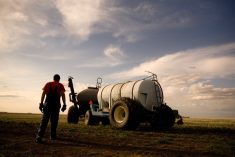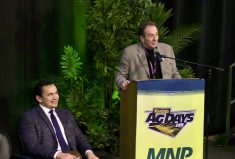Every non-family employee working on a farm must have WCB coverage — even those working for a custom operator or some other employer
The prospect of an employee suffering a serious injury or being killed on your farm is awful enough.
But farm employers without Workers Compensation Board coverage would also face the prospect of a lawsuit in such a situation.
That was the sobering message delivered to a recent farm safety meeting put on by Keystone Agricultural Producers and Manitoba Farmers with Disabilities.
“With no coverage for that worker, you would be legally exposed,” said Dwight Doell, the board’s SAFE Work Services director.
In 2009, the province made it mandatory that all paid non-family employees on farms be registered for coverage under the Workers Compensation Board. That not only provides coverage for employees, but also means employers can be sued if there’s an injury or fatality at the workplace.
Read Also

Mazergroup’s Bob Mazer dies
Mazergroup’s Bob Mazer, who helped grow his family’s company into a string of farm equipment dealerships and the main dealer for New Holland machinery in Saskatchewan and Manitoba, died July 6 from cancer.
Injured employees not only receive their wages while off work, but rehabilitative treatment costs, such as chiropractic care and physiotherapy, are covered, said Doell. Lump sums are paid for a “permanent impairment” such as blindness, and if a worker is killed, payments to surviving spouses continue until any children turn 18 (although payments continue for those pursuing post-secondary education).
“It’s a really good benefit if a horrible situation happens,” said Doell.
Farmers can be liable even if someone else’s employee is working on their farm is injured, that person’s employer doesn’t have WCB coverage.
“That’s not a situation you want to be in,” he said.
He advised farmers to check if coverage is in place before allowing someone else’s employee to work on their farm — even custom operators.
“If you’re hiring someone to do custom work for you, ask if they have WCB,” he said.
The coverage rate for farmers is 2.36 per cent of the total annual payroll. For example, coverage for a farm with a total wage bill of $20,000 would be $472, said Doell, who urged farmers to call the board to get a quote for their operation.
“Just tell us how much you think, in this upcoming year, you’ll pay in total wages,” he said. “We don’t need names, we don’t need total Social Insurance Numbers and we don’t need a breakdown (of costs).”
Employers are billed on their estimated wage bill, with adjustments at year-end.
Farmers and their family members remain exempt from the mandatory compensation scheme, but farmers can choose to buy coverage for themselves or any family members working for them. Family is defined as a spouse, children, extended family or other persons that are close relatives to the farm owner, whether or not they’re related by blood.
You make your own decision about how much personal coverage you may choose to buy, Doell said. And farm profitability is no longer a consideration when calculating personal coverage, either.
“We don’t take into consideration or worry about what the income tax return says,” he said.
“That used to be a factor in how we figured things out. We’ve made some changes there.”
He urged farmers to call the Workers Compensation Board (204) 954-4321 or visit www.wcb.mb.ca for more information.



















